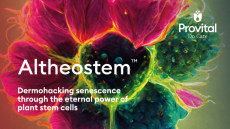Pop a pomegranate!
cuisine - the pomegranate - could protect the skin from changes
that might lead to cancer. Can we soon expect to see these
ingredients incorporated into skin creams?
Powerful antioxidant properties found in the regal fruit of Roman cuisine - the pomegranate - could protect the skin from changes that might lead to cancer. Can we soon expect to see these ingredients incorporated into skin creams?
Researchers at Wisconsin university reported that at the Frontiers in Cancer Prevention Research meeting in the US this week that pomegranate extract inhibited skin tumours in mice.
Incidence of skin cancer, which is the most frequently diagnosed malignancy in the United States, is also growing rapidly in Europe. In the UK, melanoma accounts for 2 per cent of all newly diagnosed cancers each year. Among people under 35, it is the third most common cancer in women and fifth most common in men.
Pomegranate fruit extract (PFE), from the tree Punica granatum, contains several polyphenols and anthocyanidins (pigment that gives certain fruits their dark red colour), which demonstrates a higher antioxidant activity than that of red wine and green tea, according to the Wisconsin researchers.
The team evaluated pomegranate's anti-skin tumour effects by comparing topical application of pomegranate extract on neonatal mice (CD-1) against TPA-induced markers (12-0-tetradecanoylphorbol-13-acetate), a strong promoter of chemically induced skin cancer. Applying pomegranate extract (2 mg/mouse) onto the skin of neonatal mice 30 minutes prior to TPA (3.2 µmole/mouse) application significantly inhibited TPA-mediated increases in skin edema and hyperplasia, they said.
They also tested the pomegranate extract on TPA-induced skin tumour promotion. The animals pretreated with pomegranate extract showed substantially reduced tumour incidence and lower tumour body burden. In the TPA treated group, all mice developed tumours at 16 weeks, whereas only 30 per cent of the mice treated with pomegranate extract exhibited tumours at that point.
"For the first time, we have clear evidence that pomegranate extract possesses anti-skin-tumour promoting effects," said Dr Farrukh Afaq, lead investigator of the study.
He added: "With such a variety of pathways inhibited by the topical application of the natural supplement, we are confident of its therapeutic value and hope it will translate to other models."
According to the researchers, because pomegranate is capable of inhibiting conventional as well as novel biomarkers of TPA-induced tumours, it may possess chemopreventive activity in a wide range of tumour models. The researchers plan to carry out an in-depth study to define its active agents.






![Chinese study highlights mental health challenges in atopic dermatitis, emphasising holistic patient care. [Getty Images]](https://www.cosmeticsdesign-europe.com/var/wrbm_gb_food_pharma/storage/images/_aliases/wrbm_tiny/publications/cosmetics/cosmeticsdesign-asia.com/headlines/formulation-science/chinese-research-linking-atopic-dermatitis-to-mental-health-underscores-need-for-holistic-care/17040623-1-eng-GB/Chinese-research-linking-atopic-dermatitis-to-mental-health-underscores-need-for-holistic-care.jpg)








